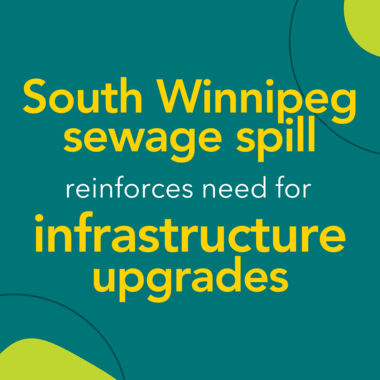Massive sewage leak reinforces critical need for wastewater infrastructure upgrades

A sewage leak at Winnipeg’s Fort Garry Bridge caused by broken pipes and subsequent failures of a temporary bypass system spilled 228.39 million litres of raw sewage into the Red River over the course of two weeks in February – the largest sewage spill to have occurred in the city in decades.
The bypass system at the Fort Garry Bridge is now operational and will remain in place until the broken pipes can be replaced, work that will continue into 2025. However, our city’s failing infrastructure continues to threaten the health of our waterways and the safety of our communities.
This latest incident is a symptom of a broader problem, which is chronic delays in upgrading Winnipeg’s sewage infrastructure. Ongoing delays threaten the health of Lake Winnipeg because raw sewage contains high concentrations of phosphorus, which drives the growth of algal blooms.
As LWF Executive Director Alexis Kanu pointed out in a Feb. 22 public statement, Winnipeg’s North End Water Pollution Control Centre (NEWPCC) is the city’s largest sewage treatment plant and the single-largest point source of phosphorus to Lake Winnipeg. Every day, the north end plant releases upwards of 150 million litres of undertreated sewage. NEWPCC has never complied with the 1 mg/L phosphorus limit first set out in the facility’s provincial operating licence back in 2005.
Together with our members, the Lake Winnipeg Foundation continues to advocate for accelerated phosphorus compliance at Winnipeg’s north end sewage treatment plant as a priority infrastructure upgrade. Most recently, we have urged Manitoba’s government to do its part to make this happen – specifically, through targeted financial investment and evidence-based changes to the facility’s operating licence.
Despite being directly impacted by failures in Winnipeg’s wastewater treatment system, affected downstream First Nations were not informed about February’s sewage spill. The lack of notification from authorities raises concerns about accountability and environmental stewardship. On Feb. 16, Treaty One Nations expressed their alarm over the potential impacts of this latest spill and stressed the need for a proactive approach to sewage infrastructure – calling for immediate repairs, a thorough investigation, meaningful consultation on planning and decision-making processes related to environmental management, prioritization of investment in wastewater infrastructure improvement and transparency in reporting environmental incidents. We support these calls to action.
The protection of Lake Winnipeg has been identified as a key commitment of Manitoba’s current government. Yet no provincial party that has formed government in the last 25 years has prioritized sewage upgrades. We will continue to hold Manitoba’s elected leaders to account for their responsibilities to Lake Winnipeg and remain steadfast in our call for accelerated action to safeguard the health of our shared waters.
Selected media resources:
- Read Windspeaker’s online coverage of the February spill, featuring comments from Treaty One Nations Chairperson Gordon BlueSky, Chief of Brokenhead Ojibway Nation.
- Watch CTV Winnipeg’s video on the fallout of February’s leak, featuring interviews with LWF Executive Director Alexis Kanu and Lake Winipeg Indigenous Collective Director Daniel Gladu Kanu
- Read Feb. 13’s Winnipeg Free Press article in which Alexis highlights the need to improve wastewater infrastructure, starting with accelerated phosphorus compliance at the north end sewage treatment plant.